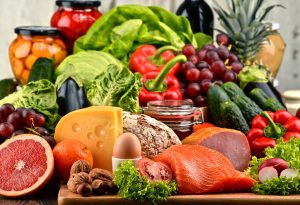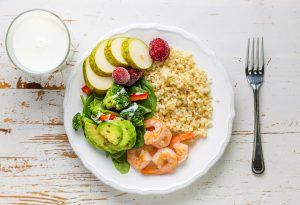In this Article
It is essential for new moms to pay attention to their diet even after delivery. As you’ll be breastfeeding your baby, adding healthy foods to your plate makes sense. If you’re wondering about the foods you should and shouldn’t eat during the postpartum recovery period, read this article.
Why Is It Important to Eat the Right Foods After Delivery?
The right foods can help your body heal itself and regain strength and energy. Not only that, if you’re breastfeeding, you cannot neglect your diet. That’s because what you eat will be pass to your baby through breast milk.
Foods You Can Eat
After delivery, include foods that belong to these five food categories.
-
Grains
Wheat, rice, oats, cornmeal, barley, and other cereal grains come under this category. Khichdi, pulao, parathas, and chapatis are some dishes you can choose from. Whole-wheat bread is rich in folic acid – a nutrient your baby needs in the first few months. In addition, it also has iron which guards against anaemia and fibre which ensures your digestive system remains healthy.
-
Vegetables
Alternate between red, dark green, and orange coloured vegetables as well as legumes such as peas and beans. You can add fenugreek seeds to your vegetable recipes to make them extra nutritious. A food which helps lactation, and also helps in weight-loss, fenugreek seeds also impart a unique flavour to food. Leafy greens like broccoli and spinach contain vitamin A, making them good for both you and your baby. Did you know that they’re also rich in calcium and antioxidants?
-
Fruits
You can opt for fresh, canned, or dried fruits. Try purees and juices to mix things up a bit! As a breastfeeding mom, you should have two or more servings of fruit or juice each day. Blueberries are filled with all the essential vitamins, minerals, and carbohydrates, and keep your energy levels high.
-
Meat & Dairy Products
Make dairy products an integral part of your daily postnatal diet. If you’re worried about the calorie consumption, go for fat-free and low-fat products like buttermilk, and yoghurt.
Salmon is a nutritional powerhouse for new moms. It contains DHA – a nutrient that plays an important role in developing your little one’s nervous system. Salmon can also elevate your mood. Studies suggest that it prevents postpartum depression.
Here are some easy ways to add eggs to your plate – scramble them for breakfast, toss a hard-boiled egg on your salad at lunchtime, or have an omelette for dinner.
-
Protein
Fish, nuts, seeds, peas, and beans are rich sources of protein. Include these in your meals. Lean meats and poultry are good choices, too. Legumes like black beans and kidney beans are great for vegetarians. They’re rich in plant protein.

-
Water
It’s also important to consume lots of water to prevent dehydration and keep up your milk supply. You can also go for fruit juices and milk.
-
Ghee
Ghee, when consumed in a moderate amount, can also aid postpartum recovery. Its brings the strength back to your body and repairs the vaginal and pelvic muscles.
Foods You Should Avoid After Delivery
Here’s a list of foods you should steer clear of, especially while breastfeeding:
-
Garlic
The smell and taste of garlic may get transferred to breast milk. Some babies don’t like how garlic smells and tastes and so, may refuse to feed.
-
Coffee
Caffeine can make your baby irritable and lead to sleeplessness. However, it is not harmful when consumed in moderation.
-
Alcohol
A lot of contrasting opinions exist about alcohol consumption during breastfeeding. However, it has been proven that drinking alcohol can lead to drowsiness, weakness, and unusual weight gain in the baby. Alcohol can adversely affect the supply of breast milk.
-
Peanuts
Some babies are allergic to peanuts. It’s best to avoid peanuts during breastfeeding.
-
Oily & Gassy Foods
As a new mom, you should stay away from oily foods that are high in calories. The same goes for gassy foods like cereals that are ‘heavy to digest’.
-
Carbonated Drinks
Stay away from fizzy drinks for a while after delivery.
-
Fish With High Mercury Content
Certain types of fish like swordfish, shark, king mackerel and tilefish contain mercury that can hamper your baby’s brain development.
Postnatal Diet Tips
It is a fact that the quality of breast milk does not change irrespective of what you eat. But if you are not eating nutritious foods, then your body will draw on your reserves of these nutrients to make up for the deficit.

Here are a few tips to eat healthily after delivery:
- Consume omega-3 fatty acids. These are found in fish and can help baby’s brain and eye development. But restrict yourself to two servings of fish per week.
- Increase the amount of protein in your diet. Protein makes you feel full for many hours and also regulates blood sugar.
- Snack regularly on healthy options like nuts and fruit to prevent binge eating.
- Prepare large portions of healthy food and freeze. When you’re too tired to cook, just heat it and have it!
- When your stomach is rumbling, you may think it’s hunger. But it may be thirst. Drink a glass of water. If it’s thirst, you won’t feel hungry after gulping down a glass of water.
- Don’t do crash dieting in order to lose weight after delivery. Losing weight too quickly can affect the supply of breast milk.
- Cookies, chips and doughnuts are okay once in a while, but they shouldn’t replace healthy foods!
- If you don’t consume meat or dairy products, you may have to take a vitamin B12 supplement. Ask your nutritionist regarding the same.
Besides eating a healthy and nutritious diet, it is important to come up with an exercise regimen that suits your pace. This will also ensure that even if you do not lose all your pregnancy weight in a jiffy, you will certainly not gain any excess weight.









